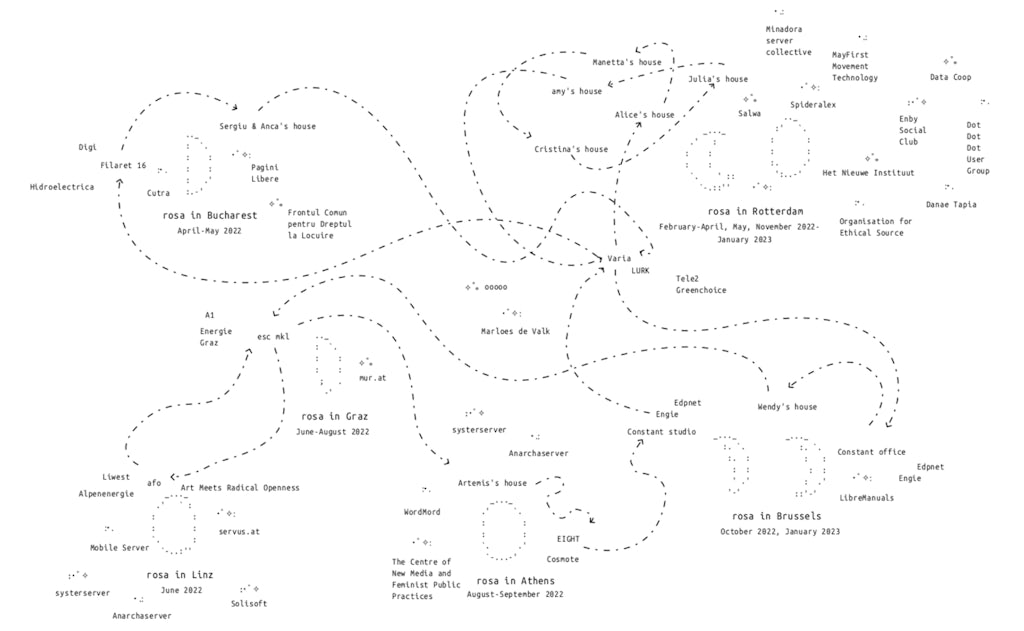A Feminist Server: Technology, Emancipation, Solidarity, and Knowledge Sharing
Throughout the research project A Fair New World?!, Flanders Arts Institute supported a collective of artists and activists in the community of so-called “feminist servers”.
Feminist servers approach computer network infrastructure – the hardware on which web pages, social media, collaborative writing tools, and more operate – not only as a technological challenge but also as a means to develop feminist values such as emancipation, solidarity, and knowledge sharing.
The computers and people form an integrated network in which personal connections are as important as the connected computers.
In line with these considerations, the ATNOFS project (A Traversal Network of Feminist Servers), funded by the Culture of Solidarity Fund (European Cultural Foundation), brought together several feminist collectives, with or without (feminist) server infrastructure, to share and extend their knowledge through live gatherings. The collective of artists and activists that Flanders Arts Institute supported during A Fair New World?! was, to a certain extent, also among the people active in the ATNOFS project.
In this way, synergies emerged between A Fair New World?! (AFNW) and ATNOFS. Nonetheless, the projects are clearly distinct. ATNOFS developed an entirely new and traveling feminist server, called “rosa,” to document the process of exchanging knowledge through live gatherings.
Rosa acts as an object of study to think through what a feminist server is (as a conceptual tool) and what forms of feminist principles matter to the groups. The AFNW collective, on the other hand, developed a video streaming platform on an existing feminist server to investigate questions of censorship, archiving, technical and human limitations, and accessibility.

A visual archive
What both projects shared, however, was the challenge of disclosing all the information and knowledge that emerged throughout the running projects. Workshops, collective note-taking, and experiments over an extended period of time led to a large volume of materials, but these are not easily accessible for others.
Given this shared concern between ATNOFS and FNW, Flanders Arts Institute offered to support the invitation of an expert in writing manuals, using their Erasmus+ accreditation. The expert was Olivier Heinry, who was trained in the Flossmanuals France Methodology. This methodology brings people together for a whole week to collectively write a manual, usually for free, open-source software.
Olivier and the people of the feminist servers quickly observed that the tight methodology for manual writing would not work. Its rigidity does not align with the fluidity that underlies the basic principles of feminist servers. Instead, as one of the collective writing strategies, they opted for the Visual Archive methodology.
This method brings the documentation of a project physically into the room, printing as much as possible and hanging it in a space. Then, topics can be traced and connected across all the papers. This can be done simultaneously by multiple people, making everything very tangible. The complex archive becomes multivoiced and layered.
On the basis of this exercise, the disparate material can be “tagged,” and these tags – called “magic words” on rosa – can be added to the digital files, so that they become linked.
Lessons learned
Next to this expertise and experience in documentation, three lessons learned emerged:
- We can imagine shifting from a utilitarian perspective in which technical infrastructure “just needs to work continuously and anonymously” towards an affective perspective in which the people working with the technology are part of the infrastructure and rightfully demand room for error, reflection, and respect for limitations, both for humans and machines.
- A logic of federation and decentralization works, and it is a healthy alternative to centralizing corporations that hoard data and information as a commodity. It is also potentially a viable alternative: technology is readily available to manage documents (e.g., NextCloud), video (e.g., Peertube), instant communications (e.g., Mastodon), etc., in such a way that users are not dependent on a single service provider. Most of the work then will be in organizing the connections, both between the decentralized infrastructure and the people working along with the technology, together with the care aspect of those realms.
- An intersectional, feminist approach to working together on and with technology is a way of empowering a community, by striving towards equality, emancipation, trust, and care. However, the worlds of art, activism, and technology are not (yet) well connected. Building more synergies here is a concrete step forward we can take.
More information
Further elaboration on these questions and topics can be found in the final publication of ATNOFS and on the project website of A Fair New World?!.
More about feminist servers:
- A Feminist Server Manifesto
- A Traversal Network of Feminist Servers (ATNOFS) publication
- rosa, a travelling feminist server


